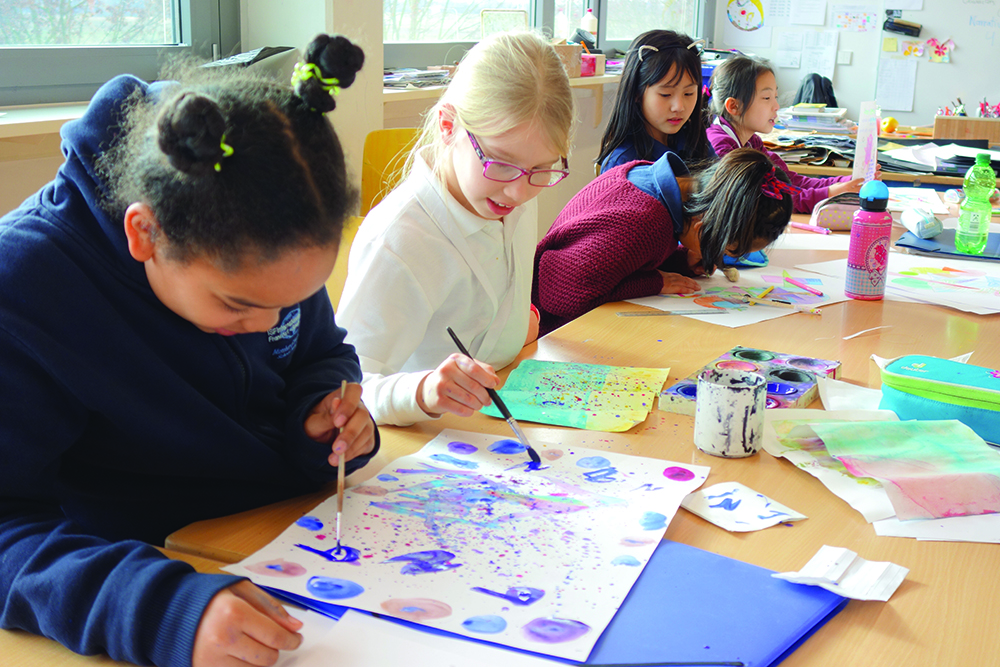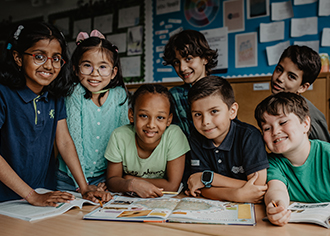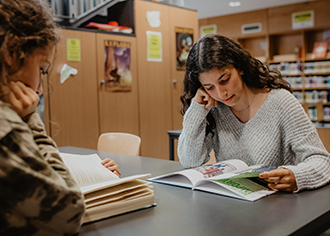The primary childhood years mark significant physical, cognitive, and emotional growth. Children become more aware of themselves and the world around them. At ISF, we provide an environment that helps students become confident in their identity and surroundings. We also work with students to develop a positive attitude towards learning, after which the foundation for academic achievement is laid.
The ISF Primary program balances academic progress with developing social, physical, and emotional maturity. Art, music, and P.E. classes also contribute to developing a healthy, eager, and happy child.
Curriculum
English
The ability to communicate effectively is an essential skill in today’s world. Our English program aims to prepare and help students be articulate communicators, proficient readers, and powerful writers.
In grades 1 and 2, students will read fluently simple texts using illustration clues, phonics sounds, knowledge of high frequency words, and basic punctuation rules. They will speak confidently and listen to what others have to say and they will write for a range of purposes and audiences, developing a clear, fluent, and legible handwriting.
In grades 3 and 4, students will read with confidence, fluency, and understanding a wide range of texts, write with accuracy and meaning for a range of purposes and audiences, in order to express ideas and opinions, and narrate events. Students will plan, draft, revise, and edit their own writing, and use spelling, punctuation, and syntax accurately. They will also use correctly formed, legible, cursive, or joined-script handwriting.
Mathematics
Math is a universal "language" that is critical for success in all walks of life. At ISF, our math program aims to help students develop an ability for mathematical thinking and an appreciation of the power and use of mathematics in the real world.
The early stage math curriculum prepares students for arithmetic operations. Students gain and master the skills of basic addition and subtraction to help them start multiplication by Grade 2. The accuracy and fluency of these essential concepts are achieved through daily practice of mental arithmetic routines. Equipped with the basic knowledge of addition and subtraction the students can also solve the basic types of word problems using pictures and visual representations leading them to the abstract algorithms of addition and subtraction.
Students also master operations on whole numbers during grades 3 and 4. Students gain the basic skills of algebraic thinking through their work with word problems and patterns. Preliminary knowledge of the terminology of measurement, geometry, and geometric measurements gives the students a feel of the end purpose of mathematics—a tool to serve them in their real-life applications as well as their future academic studies.
German
The German language is offered either as Regular German (based on Hesse curriculum) or as Foreign Language German (beginner, intermediate, or advanced).
Language instruction in German as a foreign language or as a native tongue completes the main focus of the ISF Primary School curriculum. Reinforcing what is taught in English and math, the German curriculum includes colors, numbers, letters, and sounds. Celebrating our international host country, the Primary School German program also incorporates traditional songs, rhymes, games, and festivals.
Science
The aim of the science program at this stage is for students to explore the areas of life science, physical science, and Earth and space. Students obtain and retain scientific knowledge of natural processes and elements of the environment, life processes, body systems, nutrition and health, matter and its changes, energy and forces, and the universe and its components.
Students will also acquire basic inquiry skills by putting forth questions and obtaining answers using simple but focused approaches; finding the relevance of science in everyday life practices and in the environment around them; and communicating their knowledge through writing, speech, and graphics, using simple science terminology to describe matter and the visible elements of the environment.
Social Studies
The social studies program provides students with the knowledge, skills, and attitude of understanding the world around them, their past, and gives foresight into the future. The study of geography and history are instrumental in helping students become active, responsible, and reflective members of society.
In the social studies program, students will learn to use the geographic tools that enable them to locate and describe places, as well as familiarize themselves with basic geographical concepts such as the equator, hemispheres, etc. Students are also introduced to the study of history as they learn about past cultures, major historical periods, and pivotal developments.
Computing
In this foundation phase of the computing curriculum, students will have the first encounter with the computer and its parts, use simple applications, and understand the basic ethical rules to handle technology tools.

From grades 2 to 4, students will:
- Observe, name, know, and distinguish the various external hardware parts and their uses
- Learn about the Internet and online safety
- Learn how to use computers for problem solving
- Start working on spreadsheets and electronic presentations
- Use more advanced skills related to text editing
- Learn game programming and block programming at a preliminary level
Visual Arts
The ISF visual ART curriculum allows students to take their own experiences of the world and transform them into artistic forms.

Students will learn to:
- Explore and recognize visual elements of art point, line, shape, color, space, movement, among others
- Experiment with different forms of artistic expression drawing, painting, collage, comics, paper folding, sculpture, modeling, installation, video, and photography.
- Create visual arts individually, collectively, and collaboratively, exploring different spaces of the school and the community
Music
The ISF Music Department offers students in Kindergarten through Grade 12 a context within which to develop their understanding and love of music. The Kindergarten to Grade 4 music curriculum follows the American elementary music textbook series, “Share the Music.” Music classes meet at least once per week in these grades and cover age-appropriate musical concepts. Students sing and play rhythm instruments as well as learn the basics of music reading.
All students in Kindergarten to Grade 4 perform in concerts twice annually.
The ISF Music Department also offers a number of music ensembles as part of SABIS Student Life Organization® (SLO®) as well as additional private instrumental or vocal instruction for interested students.
Physical Education
Extended Day
ISF offers an extended day care program for students from Kindergarten to Grade 4 both prior to and following the school day. This program provides adult supervision of the students in the morning from 8:00 until the start of the school day at 8:20 and from dismissal of the academic day at 15:05 (Kindergarten) or 15:25 (Pre-School - Grade 4) until 18:00.
In the afternoon, students may also participate in a variety of other organized activities and sports or join the SABIS Student Life Organization from 15:25-16:10.
Learn more about our Primary School program here.



